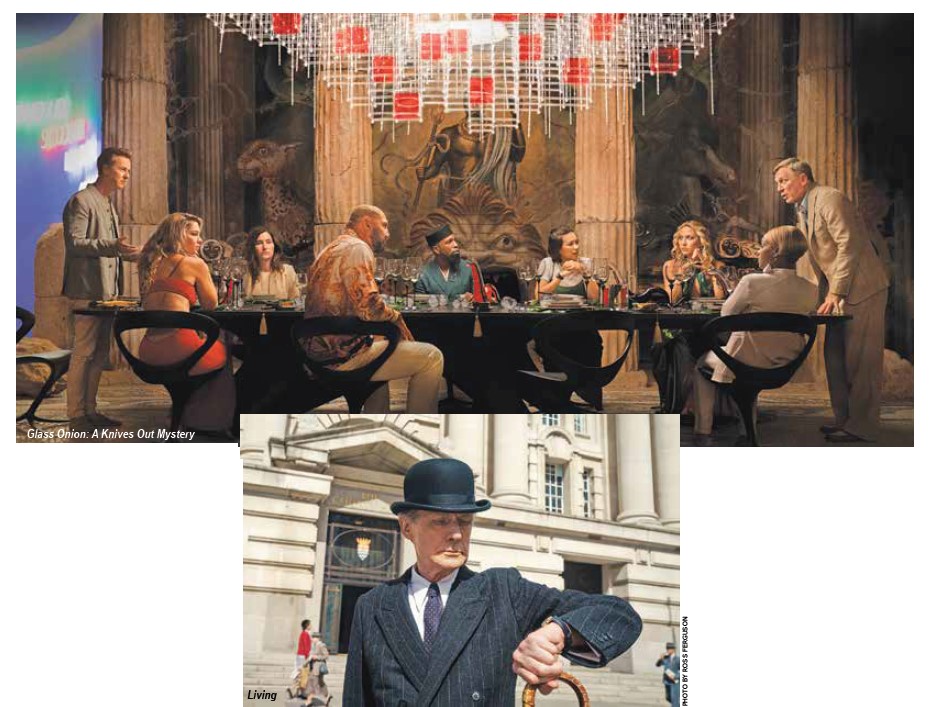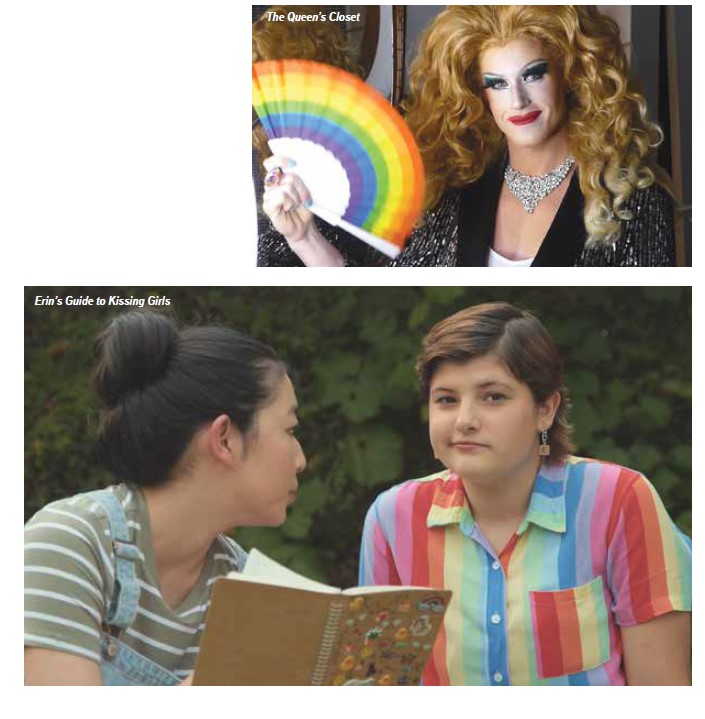
By Gary M. Kramer–
The Mill Valley Film Festival opens October 6 with Glass Onion: A Knives Out Mystery, with director Rian Johnson and actors Kathryn Hahn, Leslie Odom, Jr., and Kate Hudson expected to attend. The festival closes 10 days later with The Good Nurse, with stars Eddie Redmayne, Nnamdi Asomugha, and Tobias Lindholm expected to attend. In between, there are hundreds of features, shorts, and documentaries. Here is a rundown of the queer films to catch at this year’s festival.
Some of the biggest LGBTQ titles were not available for preview. These include two films featuring Oscar-buzzy performances—Tár, starring Cate Blanchett as a fictional queer female composer-conductor, and The Whale, with Brendan Fraser as a severely obese gay man trying to connect with his estranged daughter. Also of queer interest is Close,gay filmmaker Lukas Dhont’s tender drama about two 13-year-old boys and a tragedy, and My Policeman that is set in 1950s Britain, where Patrick (gay David Dawson) connects with Tom (Harry Styles) and Marion (non-binary actress Emma Corrin) as well as in the 1990s, when Patrick (gay Rupert Everett) reunites with Tom (Linus Roache) and Marion (Gina McKee).

Of the LGBTQ film that were available for preview, there are several worthwhile features.
One of the best is The Blue Caftan, an exquisite slow-burn romantic drama from Morocco, a country where homosexuality is illegal. Halim (Saleh Bakri) is a maalem, a tailor who works painstakingly by hand. He sews gorgeous caftans that are sold in the shop he and his wife, Mina (Lubna Azabal), own. But they are behind in their work, and she is in ill health, which is why Halim is training Youssef (Ayoub Missioui), a handsome new apprentice, to learn this dying craft. The looks Halim and Youssef exchange are full of smoldering desire, and when they touch—as when Halim trains Youssef to cut a collar or guide a needle—it is downright erotic. The Blue Caftan subtly depicts the love that develops between Halim and Youssef, as well as Halim’s deep affection for Mina. How Halim grapples with his sexuality and his conflicted thoughts and feelings—he is periodically seen having anonymous sexual trysts with men at the local hammam—forms the heart of this poignant character study. Bakri makes Halim’s internalized guilt and shame palpable and Azabal and Missioui respectively deliver steely and sensitive performances. This is a tender, achingly beautiful film.
The eye-opening documentary, Body Parts,explores how female bodies are depicted in sex scenes in cinema as well as how female nudity is filmed, negotiated, and manipulated. It is a shocking doc, full of anecdotes about what women put up with—and should not have to—as part of their job, as well as the consequences they face when they do nudity and if they don’t. Trans actress Alexandra Billings is one of the many women who are interviewed about their nude scenes in this excellent film.

Charcoal is an outstanding feature debut by writer/director Carolina Markowicz about a poor Brazilian family—Irene (Maeve Jinkings), Jairo (Rômulo Braga), and their young son, Jean (Jean de Almeida Costa)—who agree to hide Miguel (César Bordón), an Argentine kingpin, who faked his own death. Charcoal provides a wonderfully claustrophobic experience, and features a queer subplot, as it slyly comments on both inequity and the price of life.
Erin’s Guide to Kissing Girls is a sweet queer romantic comedy about Erin (Elliot Stocking), an eighth-grade lesbian who loves comics and is determined to kiss a girl before high school. She sets her sights on Sydni (Rosali Annikie), the cool new girl, and conspires not only to spend time with her, but also to ask her to the school dance. However, her goal strains Erin’s friendship with her bestie, Liz (Jesyca Gu). Erin’s Guide to Kissing Girls is geared squarely toward younger viewers, but adults can appreciate the pangs of a crush and value of being true to oneself. This is a slight but winning teen film.
The Mill Valley Film Festival also gives moviegoers an early chance to see Living, a fantastic remake of the Arika Kurosawa’s 1952 classic, Ikiru, directed by gay filmmaker Oliver Hermanus, and written by Kazuo Ishiguro. In this moving drama, Williams (Bill Nighy) is an office worker who tries to find meaning and purpose in his life now that he has very little time left to live. Gorgeously filmed (it is set in 1950s Britain), this is one of the year’s best films, and Nighy delivers an Oscar-worthy performance.
There are also several LGBTQ shorts screening at the festival in various shorts programs.
Arguably the best is Cardiff, a charming romantic comedy about Fred (Richard Elis) who is unlucky in love while his pansexual mom Sally (Ruth Madoc) and his gay friend Joe (Stifyn Parri) have multiple partners. When Fred meets Omar (Esh Alladi), he thinks he might find happiness, but the path to true love is not as straight (or gay) as it seems. Filmed in luminous black and white and filled with memorable characters and humor, Cardiff is a delight.

Two documentary shorts are Bay Area based. Last Call is a eulogy for The Stud, and other San Francisco gay bars during the pandemic. Director Drew De Pinto in under 4 minutes features images of various venues as well as reflections on their impact and importance. The vibrant and terrific short, The Queen’s Closet,has Bay Area transplants Blake and Andrew talking about the power they found in drag and gender expression, having come from conservative backgrounds.

Two short films consider queer youth. Just Johnny, from Ireland,has the title character (Daniel Willis) wanting to wear a dress to his first Holy Communion. His father Dermot (Martin McCann) is dead set against it, but his mom Maria (Roisin Gallagher) is unconditionally supportive. It is in the compromises the characters make that a solution is found in this feel-good short. Likewise, Mama Has a Mustache, a lively, animated short about kids and their attitudes about gender nonconfirming, non-binary, and trans parents.
Writer/director/star Rose Schlossberg’s Small Town Gay Tragedy #1 is a very clever short, told almost entirely without words. It concerns a woman who follows a newly spotted gay couple in town—until she makes a startling discovery.
Writer/director Luisa Dantas’ romantic drama, Riptide,has Lee (Imani Russell) and Izzy (Sofia Riba) spending their “fauxniversary” at the beach until something unexpected occurs. This is a melancholic story, well told, and the actresses have good opposites-attract chemistry.
Two somber international shorts are The Distance of Time, an elegiac Peruvian film about a young man (Carlos Caycho) whose lover (Juan Davila) is in the hospital. The film provides a snapshot of their lives as they dance and reflect on things.
One Like Him has the gay Jordanian Karim (Kais Nashif) meeting with Ramzi (Loai Noufi) in a bar to talk about when they were teens and Karim (Mohammad Nizar) was cut off from Ramzi (Hamzeh Mahadin) because of a letter he sent. Hoping to address this pivotal moment in their lives, Karim’s efforts are repeated in an attempt to make things right between them. This compassionate short captures how time can shift attitudes about homosexuality and the hope and need for acceptance.
For tickets, showtimes, and more information, visit https://www.mvff.com/
© 2022 Gary M. Kramer
Gary M. Kramer is the author of “Independent Queer Cinema: Reviews and Interviews,” and the co-editor of “Directory of World Cinema: Argentina.” Follow him on Twitter @garymkramer
Film
Published on September 22, 2022
Recent Comments